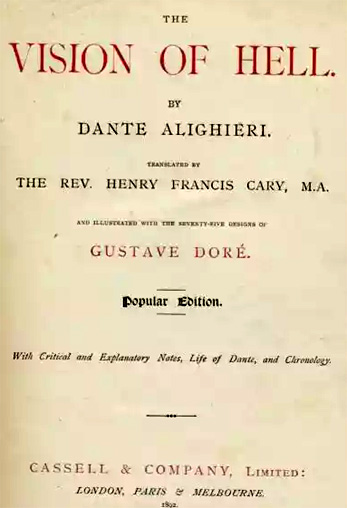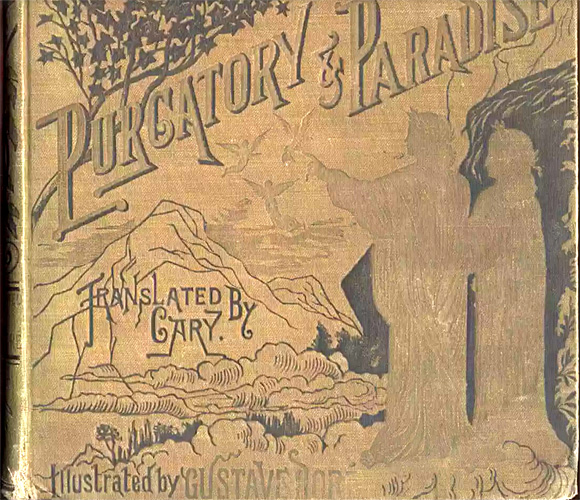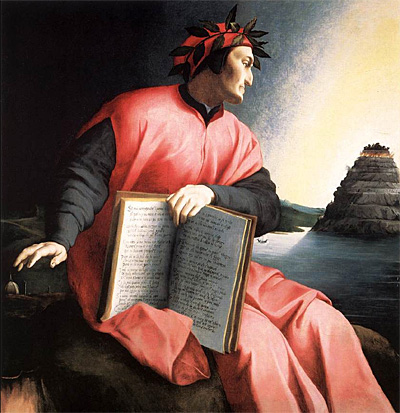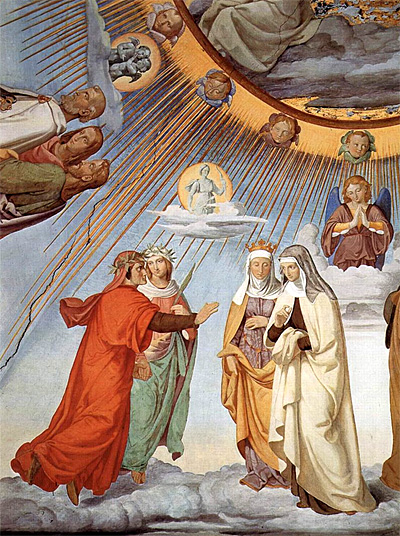HELL (or The Inferno)

Hell: Canto I (Dante lost in a Dark Wood; the Leopard, the Lion and the She–wolf; Virgil offers to guide him)
Hell: Canto II (Virgil explains why he's come; Dante takes courage)
Hell: Canto III (The Gate of Hell; the Vestibule; the Indecisive; Charon)
Hell: Canto IV (Limbo, the First Circle; the Unbaptized; the Poets)
Hell: Canto V (The Second Circle; Minos; the Carnal Sinners; Paolo and Francesca)
Hell: Canto VI (The third Circle; the Gluttons; Cerberus; Ciacco)
Hell: Canto VII (Plutus; the Fourth Circle; the Prodigal and Avaricious; Fortune; the Fifth Circle; the Wrathful and Sullen)
Hell: Canto VIII (The Fifth Circle; Phlegyas; the Rebellious Angels; the City of Dis)
Hell: Canto IX (The Three Furies; Medusa; the Angel; the Sixth Circle; the Heretics)
Hell: Canto X (The Heretics; Farinata; Cavalcante)
Hell: Canto XI (The Sixth Circle; the Tomb of the Heretical Pope, Anastasius; the Plan of Hell)
Hell: Canto XII (The Seventh Circle; the Minotaur; the Violent; the Centaurs; Chiron; the Tyrants; the Murderers)
Hell: Canto XIII (The Second Round of the Seventh Circle; the Wood of the Violent Against themselves; the Harpies; Pier delle Vigne; Lano; Jacome da Sant Andrea; Florence)
Hell: Canto XIV (The Third Round of the Seventh Circle; the Burning Sand; the Violent Against God, Nature, Art; Capaneus; the Old Man of Crete; the Rivers of Hell)
Hell: Canto XV (The Third Round of the Seventh Circle; the Sodomites; Brunetto Latini)
Hell: Canto XVI (The Third Round of the Seventh Circle; Three Florentines; the Cord)
Hell: Canto XVII (Geryon; the Usurers; Descent to the Eighth Circle)
Hell: Canto XVIII (The Eighth Circle, Malebolge, First Bolgia; the Pimps and Seducers; Jason; the Second Bolgia; the Flatterers;
Alessio Interminei; Thas)
Hell: Canto XIX (The Eighth Circle, third Bolgia; the simonists; Nicholas III; the poet's invective against simoniacal popes)
Hell: Canto XX (The Eighth Circle, Fourth Bolgia; the diviners; Amphiaraus, Tiresias, Manto, Eurypylus)
Hell: Canto XXI (The Eighth Circle, Fifth Bolgia; the grafters; the boiling pitch; Malacoda; the escort)
Hell: Canto XXII (The Eighth Circle, Fifth Bolgia; the grafters, Barbariccia, the Navarrese, Alichino, Calcabrina)
Hell: Canto XXIII (The Eighth Circle, Fifth Bolgia; slide to the sixth Bolgia; the hypocrites; the jovial friars; Caiaphas; Virgil's distress)
Hell: Canto XXIV (The Eighth Circle, Sixth Bolgia; climb to the seventh Bolgia; the thieves; Vanni Fucci; the prediction)
Hell: Canto XXV (Vanni Fucci's obscene gesture to God; Cacus; the three shades; Cianfa and Agnello merging; Buoso; Puccio Sciancato)
Hell: Canto XXVI (The Eighth Circle; prophecy against Florence; view of the Eighth Bolgia; the deceivers in flames; Ulysses)
Hell: Canto XXVII (The Eighth Circle, Eighth Bolgia; the fraudulent counselors; Guido da Montefeltro)
Hell: Canto XXVIII (The Eighth Circle, Ninth Bolgia; the sowers of scandal and schism; Mohammed; Curio; Mosca; Bertran de Born)
Hell: Canto XXIX (The Eighth Circle, Ninth Bolgia; Geri del Bello; the Tenth Bolgia; the Falsfiers; Griffolino; Capocchio)
Hell: Canto XXX (The Eighth Circle, Tenth Bolgia; the Falsifiers; Gianni Schicchi; Myrrha; Master Adam; Potiphar's Wife; Sinon; Virgil's Reproof)
Hell: Canto XXXI (The Bank to the Ninth Circle; the Giants Nimrod, Ephialtes, Briareus; Antaeus Lowers them to the Central, Frozen Pit)
Hell: Canto XXXII (The Ninth Circle, First Ring, Caïna; the Traitors to Kin in the Ice; Camiscion de' Pazzi; the Second Ring, Antenora; the Traitors to Homeland or Party; Bocca; one Sinner gnawing another)
Hell: Canto XXXIII (The Ninth Circle, Second Ring; Ugolino's Story; the Third Ring, Ptolomea; Fra Alberigo and Branca d'Oria)
Hell: Canto XXXIV (The Ninth Circle, Fourth Ring, Judecca; Dis or Lucifer; Judas, Brutus, Cassius; the Southern hemisphere; the Stars)

PURGATORY

Purgatory: Canto I (Invocation to the Muses - Dawn of Easter on the shore of Purgatory - The Four Stars - Cato - The cleansing of Dante from the stains of Hell)
Purgatory: Canto II (Sunrise - The Poets on the shore - Coming of a boat, guided by an angel, bearing souls to Purgatory - Their landing - Casella and his song - Cato hurries the souls to the mountain)
Purgatory: Canto III (Ante-Purgatory - Souls of those who have died in contumacy of the Church - Manfred)
Purgatory: Canto IV (Ante-Purgatory - Ascent to a shelf of the mountain - The negligent, who postponed repentance to the last hour - Belacqua)
Purgatory: Canto V (Ante-Purgatory - Spirits who had delayed repentance, and met with death by violence, but died repentant - Jacopo del Cassero - Buonconte da Montefeltro - Via de' Tolomei)
Purgatory: Canto VI (Ante-Purgatory - More spirits who had deferred repentance till they were overtaken by a violent death - Efficacy of prayer - Sordello - Apostrophe to Italy)
Purgatory: Canto VII (Virgil makes himself known to Sordello - Sordello leads the Poets to the Valley of the Princes who have been negligent of salvation - He points them out by name)
Purgatory: Canto VIII (Valley of the Princes - Two Guardian Angels - Kino Visconti - The Serpent - Corrado Malaspina)
Purgatory: Canto IX (Slumber and Dream of Dante - The Eagle - Lucia - The Gate of Purgatory - The Angelic Gatekeeper - Seven P's inscribed on Dante's Forehead - Entrance to the First Ledge)
Purgatory: Canto X (First Ledge: the Proud - Examples of Humility sculptured on the Rock)
Purgatory: Canto XI (First Ledge: the Proud - Prayer - Omberto Aldobrandeschi - Oderisi d' Agubbio - Provinzan Salvani)
Purgatory: Canto XII (First Ledge: the Proud - Examples of the punishment of Pride graven on the pavement - Meeting with an Angel who removes one of the P's - Ascent to the Second Ledge)
Purgatory: Canto XIII (Second Ledge the Envious - Examples of Love - The Shades in haircloth, and with sealed eyes - Sapia of Siena)
Purgatory: Canto XIV (Second Ledge: the Envious - Guido del Duca - Rinieri de' Calboli - Examples of the punishment of Envy)
Purgatory: Canto XV (Second Ledge: the Envious - An Angel removes the second P from Dante's forehead - Discourse concerning the Sharing of Good - Ascent to the Third Ledge: the Wrathful - Examples of Forbearance seen in Vision)
Purgatory: Canto XVI (Third Ledge the Wrathful - Marco Lombardo - His discourse on Free Will, and the Corruption of the World)
Purgatory: Canto XVII (Third Ledge the Wrathful - Issue from the Smoke - Vision of examples of Anger - Ascent to the Fourth Ledge, where Sloth is purged - Second Nightfall - Virgil explains how Love is the root of Virtue and of Sin)
Purgatory: Canto XVIII (Fourth Ledge The Slothful - Discourse of Virgil on Love and Free Will - Throng of Spirits running in haste to redeem their Sin - The Abbot of San Zone - Dante falls asleep)
Purgatory: Canto XIX (Fourth Ledge: the Slothful - Dante dreams of the Siren - The Angel of the Pass - Ascent to the Fifth Ledge - Pope Adrian V)
Purgatory: Canto XX (Fifth Ledge: the Avaricious - The Spirits celebrate examples of Poverty and Bounty - Hugh Capet - His discourse on his descendants - Trembling of the Mountain)
Purgatory: Canto XXI (Fifth Ledge: the Avaricious - Statius - Cause of the trembling of the Mountain - Statius does honor to Virgil)
Purgatory: Canto XXII (Ascent to the Sixth Ledge - Discourse of Statius and Virgil - Entrance to the Ledge: the Gluttonous - The Mystic Tree - Examples of Temperance)
Purgatory: Canto XXIII (Sixth Ledge: the Gluttonous - Forese Donati - Nella - Rebuke of the women of Florence)
Purgatory: Canto XXIV (Sixth Ledge: the Gluttonous - Forese Donati - Bonagiunta of Lucca - Pope Martin IV - Ubaldin dalla Pila - Bonifazio - Messer Marchese - Prophecy of Bonagiunta concerning Gentucca, and of Forese concerning Corso de' Donati - Second Mystic Tree - The Angel of the Pass)
Purgatory: Canto XXV (Ascent to the Seventh Ledge - Discourse of Statius on generation, the infusion of the Soul into the body, and the corporeal semblance of Souls after death - The Seventh Ledge: the Lustful - The mode of their Purification)
Purgatory: Canto XXVI (Seventh Ledge: the Lustful - Sinners in the fire, going in opposite directions - Guido Guinicelli - Arnaut Daniel)
Purgatory: Canto XXVII (Seventh Ledge: the Lustful - Passage through the Flames - Stairway in the rock - Night upon the stairs - Dream of Dante - Morning - Ascent to the Earthly Paradise - Last words of Virgil)
Purgatory: Canto XXVIII (The Earthly Paradise - The Forest - A Lady gathering flowers on the bank of a little stream - Discourse with her concerning the nature of the place)
Purgatory: Canto XXIX (The Earthly Paradise - Mystic Procession or Triumph of the Church)
Purgatory: Canto XXX (The Earthly Paradise - Beatrice appears - Departure of Virgil - Reproof of Dante by Beatrice)
Purgatory: Canto XXXI (The Earthly Paradise - Reproachful discourse of Beatrice, amid confession of Dante - Passage of Lethe - Appeal of the Virtues to Beatrice - Her Unveiling)
Purgatory: Canto XXXII (The Earthly Paradise - Return of the Triumphal procession - The Chariot bound to the Mystic Tree - Sleep of Dante - His waking to find the Triumph departed - Transformation of the Chariot - The Harlot and the Giant)
Purgatory: Canto XXXIII (The Earthly Paradise - Prophecy of Beatrice concerning one who shall restore the Empire - Her discourse with Dante - The river Eunoe - Dante drinks of it, and is fit to ascend to Heaven)
PARADISE

Paradise: Canto I (Ascent to First Heaven - Proem - Invocation - Beatrice and Dante ascend to the Sphere of Fire - Beatrice explains the cause of their ascent)
Paradise: Canto II (First Heaven: Sphere of the Moon - Proem - The cause of Spots on the Moon - Influence of the Heavens)
Paradise: Canto III (First Heaven: Sphere of the Moon - Spirits whose vows had been broken - Piccarda Donati - The Empress Constance)
Paradise: Canto IV (First Heaven: Sphere of the Moon - Doubts of Dante, respecting the justice of Heaven and the abode of the blessed, solved by Beatrice - Question of Dante as to the possibility of reparation for broken vows)
Paradise: Canto V (First Heaven: Sphere of the Moon, Second Heaven: Sphere of Mercury - The sanctity of vows, and the seriousness with which they are to be made or changed - The shade of Justinian)
Paradise: Canto VI (Second Heaven: Sphere of Mercury - Justinian tells of his own life - The story of the Roman Eagle - Spirits in the planet Mercury - Romeo)
Paradise: Canto VII (Second Heaven: Sphere of Mercury - Discourse of Beatrice - The Fall of Man - The scheme of his Redemption)
Paradise: Canto VIII (Third Heaven: Sphere of Venus - Spirits of Lovers, Source of the order and the varieties in mortal things)
Paradise: Canto IX (Third Heaven: Sphere of Venus - Conversation of Dante with Cunizza da Romano - With Folco of Marseilles - Rahab - Avarice of the Papal Court)
Paradise: Canto X (Fourth Heaven: Sphere of the Sun - Spirits of the wise, and the learned in theology - St. Thomas Aquinas - He names to Dante those who surround him)
Paradise: Canto XI (Fourth Heaven: Sphere of the Sun - The Vanity of worldly desires - St. Thomas Aquinas undertakes to solve two doubts perplexing Dante - He narrates the life of St. Francis of Assisi)
Paradise: Canto XII (Fourth Heaven: Sphere of the Sun - Second Circle of the spirits of wise religious men, doctors of the Church and teachers - St. Bonaventura narrates the life of St. Dominic, and tells the names of those who form the Circle with him)
Paradise: Canto XIII (Fourth Heaven: Sphere of the Sun - St. Thomas Aquinas speaks again, and explains the relation of the wisdom of Solomon to that of Adam and of Christ, and declares the vanity of human judgment)
Paradise: Canto XIV (Fourth Heaven: Sphere of the Sun, Fifth Heaven: Sphere of Mars - At the prayer of Beatrice, Solomon tells of the glorified body of the blessed after the Last Judgment - Souls of the Soldiery of Christ in the form of a Cross with the figure of Christ thereon - Hymn of the Spirits)
Paradise: Canto XV (Fifth Heaven: Sphere of Mars - Dante is welcomed by his ancestor, Cacciaguida - Cacciaguida tells of his family, and of the simple life of Florence in the old days)
Paradise: Canto XVI (Fifth Heaven: Sphere of Mars - The boast of blood - Cacciaguida continues his discourse concerning the old and the new Florence)
Paradise: Canto XVII (Fifth Heaven: Sphere of Mars - Dante questions Cacciaguida as to his fortunes - Cacciaguida replies, foretelling the exile of Dante, and the renown of his Poem)
Paradise: Canto XVIII (Fifth Heaven: Sphere of Mars, Sixth Heaven: Sphere of Jupiter - Words shaped in light upon the planet by the Spirits - Denunciation of the avarice of the Popes)
Paradise: Canto XIX (Sixth Heaven: Sphere of Jupiter - The voice of the Eagle - It speaks of the mysteries of Divine justice; of the necessity of Faith for salvation; of the sins of certain kings)
Paradise: Canto XX (Sixth Heaven: Sphere of Jupiter - The Song of the Just - Princes who have loved righteousness, in the eye of the Eagle - Spirits, once Pagans, in bliss - Faith and Salvation - Predestination)
Paradise: Canto XXI (Seventh Heaven: Sphere of Saturn - Spirits of those who had given themselves to devout contemplation - The Golden Stairway - St. Peter Damian - Predestination - The luxury of modern Prelates)
Paradise: Canto XXII (Seventh Heaven: Sphere of Saturn - Beatrice reassures Dante - St. Benedict appears - He tells of the founding of his Order, and of the falling away of its brethren. Beatrice and Dante ascend to the Starry Heaven - The constellation of the Twins - Sight of the Earth)
Paradise: Canto XXIII (Eighth Heaven: Sphere of the Fixed Stars - The Triumph of Christ)
Paradise: Canto XXIV (Eighth Heaven: Sphere of the Fixed Stars - St. Peter examines Dante concerning Faith, and approves his answer)
Paradise: Canto XXV (Eighth Heaven: Sphere of the Fixed Stars - St. James examines Dante concerning Hope - St. John appears,with a brightness so dazzling as to deprive Dante, for the time, of sight)
Paradise: Canto XXVI (Eighth Heaven: Sphere of the Fixed Stars - St. John examines Dante concerning Love - Dante's sight restored - Adam appears, and answers questions put to him by Dante)
Paradise: Canto XXVII (Eighth Heaven: Sphere of the Fixed Stars, Ninth Heaven: the Primum Mobile - Denunciation by St. Peter of his degenerate successors - Dante gazes upon the Earth - Ascent of Beatrice and Dante to the Crystalline Heaven - Its nature - Beatrice rebukes the covetousness of mortals)
Paradise: Canto XXVIII (Ninth Heaven: the Primum Mobile - The Heavenly Hierarchy)
Paradise: Canto XXIX (Ninth Heaven: the Primum Mobile - Discourse of Beatrice concerning the creation and nature of the Angels - She reproves the presumption and foolishness of preachers)
Paradise: Canto XXX (Tenth Heaven: the Empyrean - Ascent to the Empyrean - The River of Light - The celestial Rose - The seat of Henry VII - The last words of Beatrice)
Paradise: Canto XXXI (Tenth Heaven: the Primum Mobile - The Rose of Paradise - St. Bernard - Prayer to Beatrice - The glory of the Blessed Virgin)
Paradise: Canto XXXII (Tenth Heaven: the Empyrean - St. Bernard describes the order of the Rose, and points out many of the Saints - The children in Paradise - The angelic festival - The patricians of the Court of Heaven)
Paradise: Canto XXXIII (Tenth Heaven: the Empyrean - Prayer to the Virgin - The Beatific Vision - The Ultimate Salvation)
|

